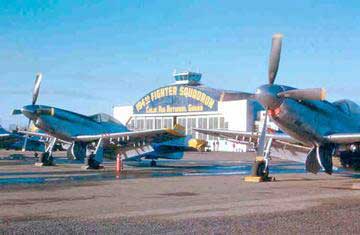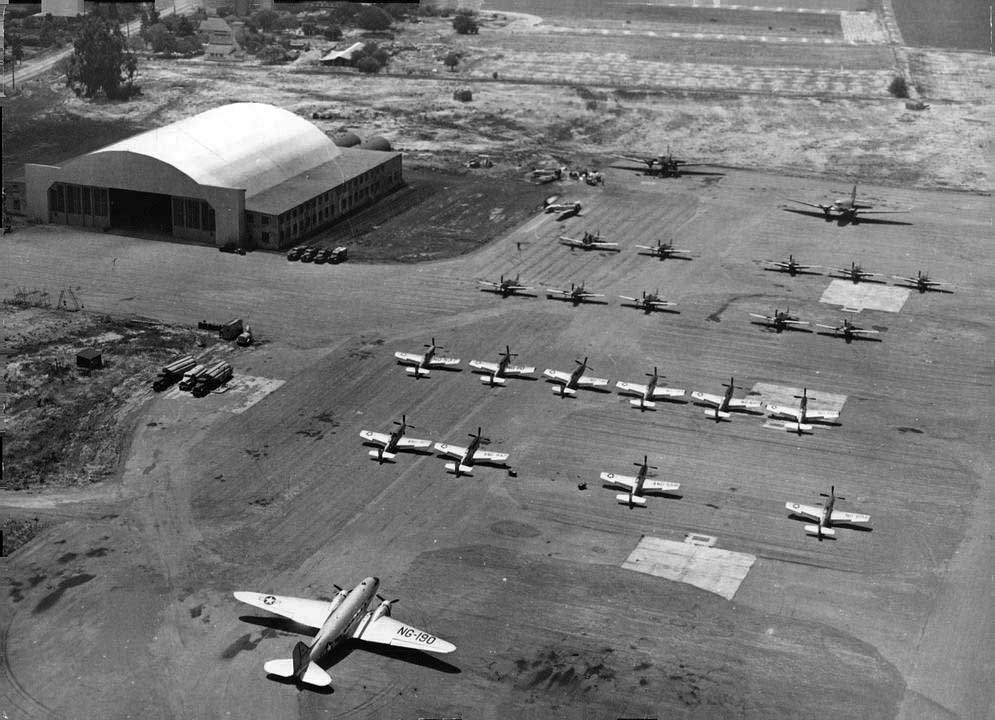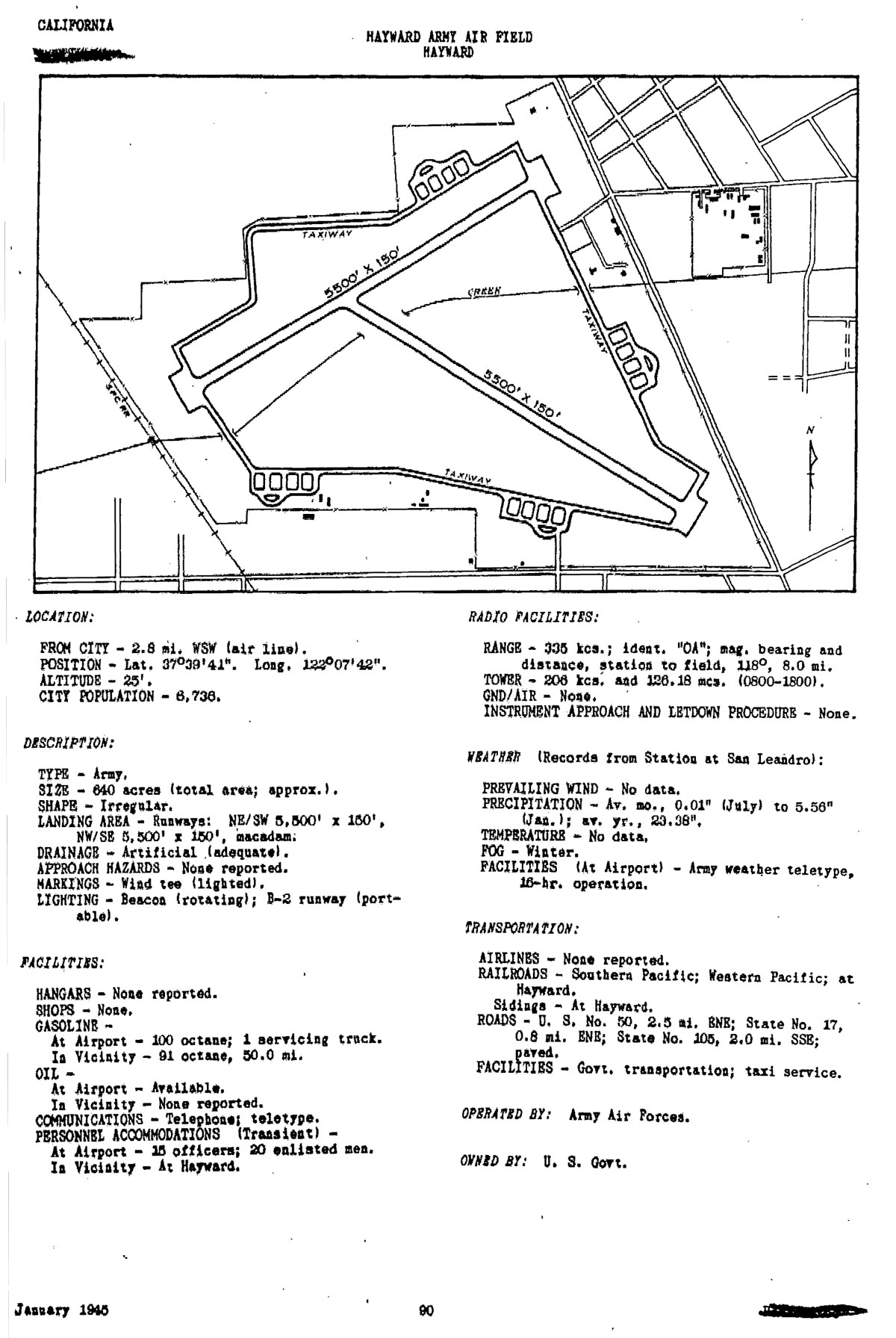- Historic California Posts, Camps,
Stations and Airfields
- Hayward Air National Guard Base
- (Russell City Army Air Field,
Hayward Army Air Field)
-

- P-51D's of the 194th
Fighter Squadron at Hayward ANG Base (Courtesy of Bill Larkins)
History
-
- In 1942 Hayward Army Air Field west of
the city of Hayward was built as an auxiliary field to Chico
Army Air Field. The primary aircraft stationed at the field
were P-38 fighter aircraft. This post may have also named "Russell
City Army Air Field" for the unicorporated area outside
of the Hayward city limits where it was located.
-
- Later it came under the control of Hamilton Field. Hayward became a
civilian airport in 1946 and in August 1947 it was deeded to
the City of Hayward. It was called Hayward Municipal Airport,
became Hayward Air Terminal in 1963, and in January 1999 it was
named Hayward Executive Airport. It is a general aviation and
corporate operating field.
-
- The California Air National Guard moved
onto land adjoining the airport in 1949. A control tower was
erected in 1960. Initially it was the home of the 61st Fighter
Wing which included the 194th Fighter Squadron on 25 June 1948.
The 61st Fighter Wing was redesignated as the 144th Fighter Bomber
Wing on 1 November 1950. The wing also consited of the 192nd
Fighter Squadron at Reno, Nevada and the 191st Fighter Squadron
at Salt Lake City, Utah.
The P-51D and later the P-51H were flown
from 1948 until 31 October 1954. During its early years with the
P-51D/H, the unit earned prominence as one of the Air Force's
most respected aerial gunnery competitors. In June, 1953, while
still flying the P-51, the unit qualified for the first all-jet,
worldwide gunnery meet. Using borrowed F-86A Sabre jets, the 144th,
which represented the Air National Guard, placed fifth in competition.
On 1 November 1954, the 194th accomplished
the transition from the piston-engined, propeller driven P-51
to its first jet aircraft, the F-86A. At the same time, the 194th
relocated to Fresno, followed by the wing in 1957. The site of
the Fresno Air National Guard Base
has been used for military aviation since World War II, when it
was known as Hammer Field.
- For 22 years after the Korean War the
field was home to the 129th Air Rescue
Squadron, (including it's several redesignations), of the
California Air National Guard. In 1955 the California ANG was
authorized to organize a new squadron to replace its 194th FIS
at Hayward Airport; the new unit was the 129th Search and Rescue
Squadron (SRW) (Medium), an ANG-manned unit which had been activated
during the Korean War in August 1951 and had been assigned to
the 111th SRW to serve alongside a Pennsylvania ANG squadron,
the 103rd. The 129th SRS was inactivated on January 1, 1953 after
the PA ANG unit was returned to state control.
-
- On April 3, 1955 the 129th Air Resupply
Squadron was established at Hayward and equipped with Curtiss
C-46D Commandos in the Summer 1955 supplemented by Grumman SA-16A
Albatrosses in 1958. The C-46Ds phased out 1 November 1958: redesignated
129th Troop Carrier Squadron (Medium). January 20, 1962 reached
Group status with federal recognition of the 129th Troop Carrier
Group. May 1, 1980: permanent change of station from Hayward
Air Terminal to NAS Moffett Field.
-
- Sources: 144th Fighter Wing,
Ron Reuthers and Bill Larkins
-

- Hayward Air National
Guard Base, then home of the California Air National Guard's
61st Fighter Wing (after 1950, 144th Fighter-Bomber Wing). (California
Military Department Historical Collection)
-
-
- Army Corps of Engineers History,
Hayward Army Air Field
-
- Hayward Army Air Field is located in the
County of Alameda, two miles west of Hayward and 11 miles southeast
of Oakland, California. The site consisted of 727.125 acres:
713.05 acres fee was acquired from private owners between December
2, 1942 and July 10, 1944; 14.02 acres easement was acquired
from Leslie Salt Company, the City of Hayward and private owners
between April 17, 1943 and May 5, 1944; and 0.055 of an acre
license was acquired from Southern Pacific Company on April 27,
1943. All property was acquired by direct purchase or Declaration
of Taking.
Hayward Army Air Field was used by the Fourth Air Force) as a
sub-base of Chico Army Air Field and later Hammer Field, and
a military reservation which included an easement known as Sulphur
Creek Drainage Ditch near the area of Russell city Air Field.
Use of this property at the time of acquisition was agricultural,
with the exception of one pickle processing plant and one trucking
agency. buildings and improvements constructed on the site consisted
of: housing, barracks, day room, mess hall, dispensary, lavatories,
club house, school, shops, fire station, guard shelter, beacon
tower, storehouse, paint shop, four 25,000 gallons underground
gasoline storage tanks, runways, taxi apron, incinerator, siren
and tower, sheds and fuel pits. Some of original farm buildings
were left on the land for camouflage purposes.
Real property disposal report was dated November 15, 1945. The
War Assets Administration (WAA) assumed accountability of the
727.125 acres on December 20, 1946. On July 18, 1946, 22.17 acres
were transferred, at the request of the WAA, by the War Department
to the Federal Public Housing Authority. By deed dated April
16, 1947, 690.88 acres were quitclaimed to
the City of Hayward; the deed contained a permanent recapture
clause which was released by the Federal Aviation Administration
on July 23, 1965. The lessor interest of 14.075 acres of
perpetual easements and license was assumed by the WAA on December
20, 1946.
-
- Building Inventory
-
- Number
Designation
-
- T-1 Flag Pole
T-2 Base Headquarters
T-3 Guard Shelter
T-7 Officers Quarters
T-9 Officers Quarters
T-15 Paint Shop
T-16 Barracks
T-18 Supply
T-19 Supply
T-22 Lavatory
T-25 Barracks
T-28 Carpenter Shop
T-29 Officers Quarters (Family)
T-30 Chlorinator
T-40 Lavatory
T-43 Officers Quarters
T-45 Officers Club
T-46 Officers Club
T-48 Storehouse
T-49 Barracks
T-50 Day Room
T-52 Barracks
T-53 Barracks
T-55 Mess Hall
T-56 Incinerator
T-57 Barracks
T-58 Dispensary
T-59 Barracks
T-62 Lavatory
T-65 Barracks
T-67 Barracks
T-68 Barracks
T-70 Siren and Tower
T-75 Barracks
T-80 Beacon Tower
T-101 Link Trainer
T-102 School
T-103 Shop
T-104 Operations and Control Tower
T-106 Fire Station
T-107 Radio Shack
- T-108 Farm House (pre-existing)
- T-110 Wind Tee
T-111 Storage
T-112 Magazine
T-113 Storage
T-114 Guard Shelter
T-115 A.C. Gas Storage
T-125 Fuel Storage
- T-126 Farm Buildings (pre-existing)
T-127 Farm Buildings (pre-existing)
T-145 Skeet Range
T-150 Fuel Pit
T-190 Fuel Pit
-
-
-
- Army Units
Assigned to Hayward Army Air Field
|
Data Source |
Date(s) |
Unit(s) |
| Army
of the United States Station List |
1 June
1943 |
- Detachment, 1st Airways Communications
Squadron, Regional (AAF)
|
| www.armyairforces.com |
4
June-4 October1943 |
362nd
Fighter Squadron (P-39) (AAF) |
| www.armyairforces.com |
8
December 1943- 8 March 1944 |
394th
Fighter Squadron (P-39) (AAF) |
| Army
of the United States Station List |
7 April
1945 |
- Detachment, Section D, 87th
Army Air Forces Base Unit (101st Army Airways Commincations Squadron)
(AAF)
|
- AAF - Army Air Forces
units | AGF - Army Ground Forces | ASF - Army Service Forces
units | WDC - Western Defense Command
-
-
- Extract, Army Air Forces Directory
of Airfields, January 1945

-
- Additional Histories
-
- Wikipedia: http://en.wikipedia.org/wiki/Hayward_Executive_Airport
-
- Search
our Site!
-
-
Questions and comments concerning
this site should be directed to the Webmaster
-
- Updated 8 February 2020



